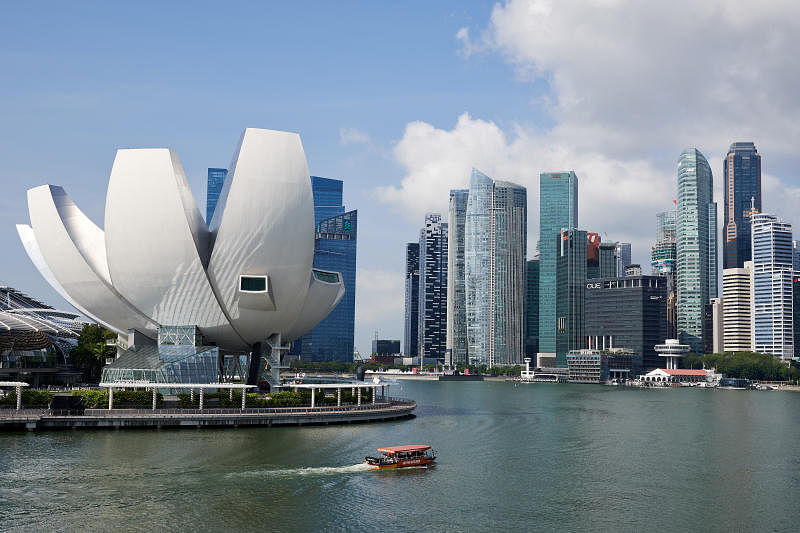Singapore Budget 2020: Highest projected deficit of $10.9 billion in decade to cushion coronavirus fallout
Sign up now: Get ST's newsletters delivered to your inbox

Singapore's expected $10.9 billion Budget deficit this year is a sharp climb from the $1.7 billion deficit chalked up in 2019, revised from the initial $3.5 billion deficit forecast a year ago.
PHOTO: ST FILE
SINGAPORE - Armed with a $6.4 billion arsenal to fight the coronavirus and its fallout on the economy, this year's expansionary Budget could run a historic deficit of $10.9 billion - the highest in 10 years.
Coming in at 2.1 per cent of gross domestic product (GDP), it exceeds the projected deficit of $8.7 billion in 2009 during the global financial crisis, when the Government rolled out a $20.5 billion Resilience Package to help Singaporeans and businesses.
That deficit was eventually pared down to $0.82 billion, or just 0.3 per cent of GDP.
But unlike 2009, when the Government dipped into the past reserves, some powder has been kept dry this time around - thanks to a surplus of $18.7 billion accumulated over the current term of government.
Unveiling the 2020 Budget statement on Tuesday (Feb 18), Deputy Prime Minister Heng said that Singapore is expected to have a $10.9 billion Budget deficit this year.
This is a sharp climb from the $1.7 billion deficit chalked up last year, revised from the initial $3.5 billion deficit forecast a year ago.
Expected revenue and expenditure
This year, revenue is expected to come in at $76 billion, a $1.3 billion increase over revised 2019 estimates.
This is mainly due to higher collections from statutory boards' contributions, corporate and personal income taxes and other taxes. But the increase will be partly offset by decreases in vehicle quota premiums and motor vehicle taxes.
Statutory board contributions - led by the Monetary Authority of Singapore (MAS) - are expected to go up by 44 per cent to $2.6 billion.
With the expected decrease in new certificate of entitlement (COE) quotas and weaker economic sentiment, revenues from vehicle quota premiums are estimated to dip by $0.3 billion to $2.6 billion - a 9.2 per cent fall.
Ministries' total expenditures are projected to be $83.6 billion, 7 per cent up on 2019.
Higher spending in healthcare, national development and transport will be offset by lower development spending needs under trade and industry expenditure.
Healthcare spending is expected to spike by $1.9 billion or 16.2 per cent - as a result of higher subsidies to public hospitals and other healthcare institutions, as well as contingency funding to tackle the coronavirus outbreak.
Major development projects, such as the Woodlands Health Campus, Singapore General Hospital Emergency Medical Building and IT infrastructure, will also add to the healthcare bill.
A $0.7 billion (7.1 per cent) increase in transport spending will go to MRT development.
Big contribution from net investment returns
At $17 billion, the net investment returns contribution (NIRC) last year continued to be the top contributor to government coffers, overtaking corporate and personal income taxes, and the goods and services tax (GST), the three largest sources of tax revenue.
Since 2016, the returns from Singapore's invested reserves have been the single largest source of government revenue.
The NIRC comprises 50 per cent of the net investment returns on net assets invested by GIC, MAS and Temasek - the three entities tasked with managing and investing the reserves - and 50 per cent of the net investment income derived from past reserves from the remaining assets.
The NIRC more than doubled from $7.01 billion in 2009 to $17.05 billion last year, partly due to the inclusion of government investment company Temasek in the net investment returns framework in 2015.
For this year's Budget, the trend is set to continue, with NIRC estimated at $18.63 billion.
In the last two years, reliance on the NIRC has increased, with the component growing slightly as a percentage of GDP.
Singapore introduced the net investment returns framework back in 2008. This started out with the reserves managed by GIC and MAS. Temasek was included in the framework in 2015.
What happens when there is a Budget surplus or deficit
The Government is required to maintain a balanced Budget over each term under Singapore's Constitution. Any Budget surplus or deficit cannot be carried over to the next term of government.
However, it can accumulate surpluses over its term, which is typically five years.
Under each term of government, any surplus at the end of a fiscal year (FY) is kept as current reserves. These can be tapped, if needed, in subsequent years during its term.
Since the current term of government took office after the 2015 General Election, it has managed to accumulate surpluses, which last year were shared with Singaporeans through the Bicentennial Bonus. Low-income Singaporeans received up to $300 in GST vouchers.
At the end of each term of government, the accumulated current reserves are transferred to the past reserves, which are protected by the Constitution.
The Government may draw on past reserves to supplement its Budget in times of unusual expenditure needs, but only with the approval of Parliament and the President. This was done in 2009 during the global financial crisis.
A Budget deficit in any given year is not an issue so long as it can be offset by surpluses accumulated since the start of the current term of government.
This would be the case for this year's estimated Budget deficit.


